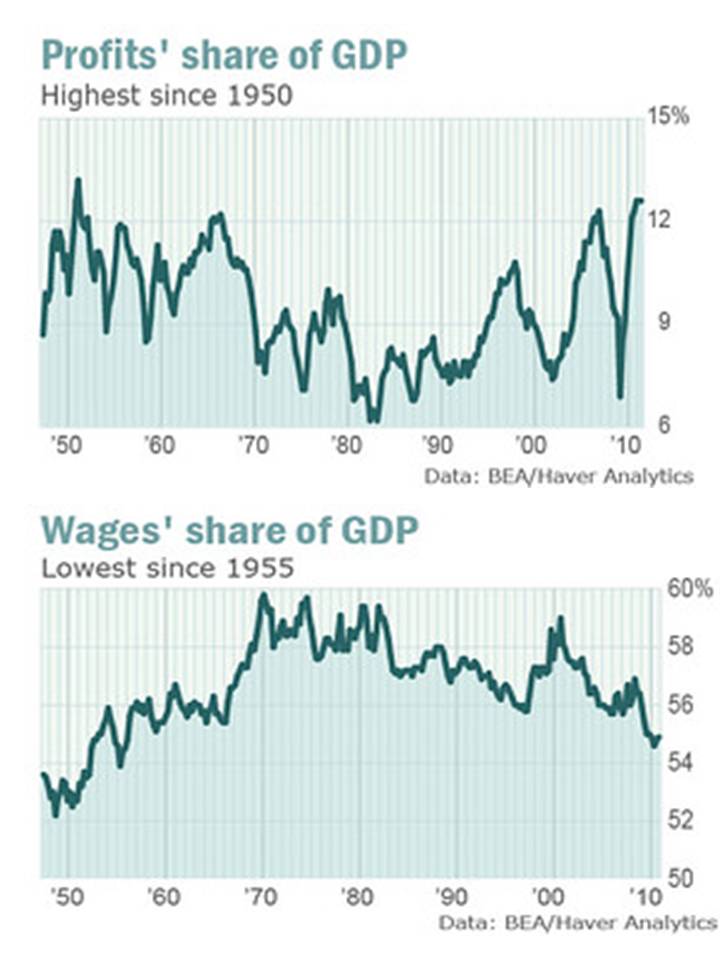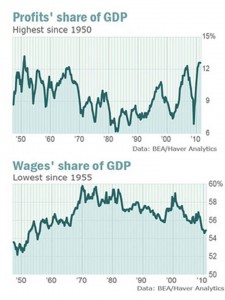By Jim Hoover
Paul Krugman’s “The Bleeding Cure” oped this week in the NY Times provided the comparison of the Middle Age practice of bleeding the patient to make them healthy, to the mistaken notion that our recession can be cured with reduced deficits.
The problem with this analogy is that ignorance does not guide economic policy in our modern world; power politics does. Indeed making this comparison tends to excuse a deliberate jobs-dampening policy, a policy approved by business interests and promulgated by the Republican majority in the House, by state houses with Republican majorities, and singularly affirmed by the conservative-controlled media.
Global corporations do want austerity, especially when they can maintain record profits and reduce their taxes. The third quarter last year saw American businesses earning profits of $1.659 trillion, the highest figure recorded over the last 60 years. In fact, since late 2008, employment, wages, and operating costs have been slow to rise while profits have soared, even as over 15 million Americans remained mired in unemployment. History offers few parallels to this phenomenon.
The private sector has been the chief source of massive dislocation in the labor market, and also a beneficiary. Over the past two years, productivity has soared while unit labor costs have plummeted: fewer of the employed are asked to do more and more for less pay. Private sector union membership is the lowest on record, and at the same time the profits-per-employee are the highest on record.
Generally economists say that businesses want full employment because it adds more consumers to spend money for their products. The above – graphs and figures — show that today’s economy is different.
Global corporations do not need, indeed, do not want full employment. Thus they are perfectly satisfied with the Republican effort to balance the budget on the backs of the middle class and at the expense of over 9% unemployed. Low production costs can be assured with low wages and higher productivity from fewer workers, and consumer demand can come from foreign markets to make up for deflated consumption in the US. The result is still higher profits.
Per the graphs above, a recent MarketWatch.com showed a Commerce Department report that corporate profits in the last three years were $343 billion higher than earlier estimated while personal incomes of American families were $265 billion lower than previously estimated. This is no surprise to struggling households.
The champions of this war against the middle class and full employment are of course Republicans. They control the debate by flooding the media with the declared need for lower taxes and deficit reduction, by propagating lies about high individual tax levels, when overall taxes are at the lowest level since 1958, and by beating the drums about high corporate tax rates when the effective tax rate is among the lowest. Their propaganda story intends to starve personal and infrastructure investment while coddling the rich.
An added benefit to this social contract austerity is the more likely election of Republicans in 2012 as voters are still failing to see that their fortunes plummet when Republicans are in power while fortunes of the rich grow.
At the state levels, Republicans are busy demonizing unions, strangling education, and subsidizing private industry, all at the expense of the middle and the working classes. Propaganda has a continuing role by filling the education void with misinformation favoring corporate endeavors.
Conservatives got all bases covered: suppress progressive voting with anti-voting legislation, kill unions that favor Democrats, destroy the safety net for the middle class, kill education and opportunity, and destroy all safety nets.
Krugman’s column suggests that balancing the budget is borne of ignorance but it is more like a definitive plan that hurts the American majority while the rich thrive, and Republican prospects soar.
Bleeding the Middle Class,




